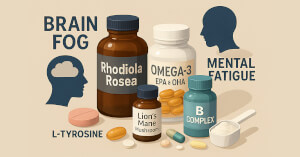
Ginkgo Biloba
Ginkgo Biloba is used to improve cognitive function, enhance memory, and support circulation.
Ginkgo Biloba is one of the oldest living tree species and has been used in traditional Chinese medicine for thousands of years. Its leaves are prized for their potential cognitive and circulatory benefits.
Ginkgo contains flavonoids and terpenoids that may enhance blood flow and protect against oxidative stress, particularly in the brain. Extracts are often standardized for consistent levels of active compounds.
Commonly used to support memory, focus, and healthy circulation, Ginkgo Biloba has shown promising effects in some studies. However, findings vary and more research is needed to determine its long-term effectiveness.
Other names & forms of Ginkgo Biloba supplement : ginkgo, maidenhair tree, ginkgo extract, ginkgo leaf
Possible Benefits
Ginkgo Biloba offers powerful benefits for brain health, blood flow, and cellular protection against oxidative stress:
- Known to enhance memory and mental clarity, making it a popular choice for Cognitive Health.
- Supports healthy circulation, especially to the brain and extremities, promoting Blood Flow & Circulation.
- May help reduce symptoms of anxiety and support Nervous System & Stress Relief.
- Offers antioxidant protection, potentially slowing age-related decline and contributing to Anti-Aging.
Side Effects
As you try Ginkgo Biloba, you might enjoy enhanced memory, but some users notice mild reactions as circulation improves. Watch for:
- Mild headache or dizziness, especially when first starting
- Occasional gastrointestinal upset, nausea or diarrhea, if taken on an empty stomach
- Possible allergic skin reactions, rash or itching, in those sensitive to Ginkgo species
- Increased bleeding tendency, easy bruising or nosebleeds, in sensitive individuals
- Rare heart palpitations or lightheadedness at higher doses
Interactions
Possible interactions include:
- Anticoagulant and antiplatelet therapies: Ginkgo’s ginkgolides can inhibit platelet-activating factor, compounding warfarin or supplements such as Garlic, leading to elevated bleeding risk.
- Antidepressants (SSRIs): Ginkgo may affect serotonin uptake; combined with SSRIs like sertraline or supplements like Bacopa, it could increase serotonin-related side effects.
- Anticonvulsant drugs: Potential CYP450 interactions; Ginkgo may lower seizure threshold when used with phenytoin or carbamazepine, use cautiously.
- Antidiabetic medications: Ginkgo can influence insulin sensitivity; monitor blood glucose when used with insulin or Cinnamon.
Precautions
Before adding Ginkgo Biloba to your regimen, make sure none of the following apply to you. If they do, consult your healthcare provider:
- Pregnant or breastfeeding women: Limited safety data; best to avoid or use only under medical supervision
- Individuals on blood-thinning medications: Ginkgo may increase bleeding risk; monitor INR and clotting parameters
- People with seizure disorders: Potential to lower seizure threshold; avoid unless cleared by a neurologist
- Those with recent stroke or hemorrhage history: Increased bleeding risk in cerebral vessels; use with extreme caution
- Patients scheduled for surgery: Discontinue at least two weeks prior, may interact with anesthesia and affect clotting
Studies
These studies provide scientific insights into Ginkgo Biloba benefits:
A 2012 Ginkgo Evaluation of Memory study in 3 069 adults found 240 mg/day Ginkgo biloba for a median 6.1 years did not prevent dementia or Alzheimer’s disease .
A 2010 meta-analysis of nine RCTs in dementia patients reported Ginkgo extract improves cognitive performance but noted low-quality evidence and small sample sizes.
A 2011 single-dose trial in healthy volunteers showed 240 mg Ginkgo improved reaction time and certain memory tasks but had no effect on implicit memory tests versus placebo.
A 2010 RCT in peripheral artery disease patients found 120 mg twice daily for 6 months increased pain-free walking distance by 26% from baseline but did not differ significantly from placebo .
Disclaimer: This page is for educational purposes and does not replace medical advice. If you're pregnant, have a condition, or take medication, speak with a qualified professional.










